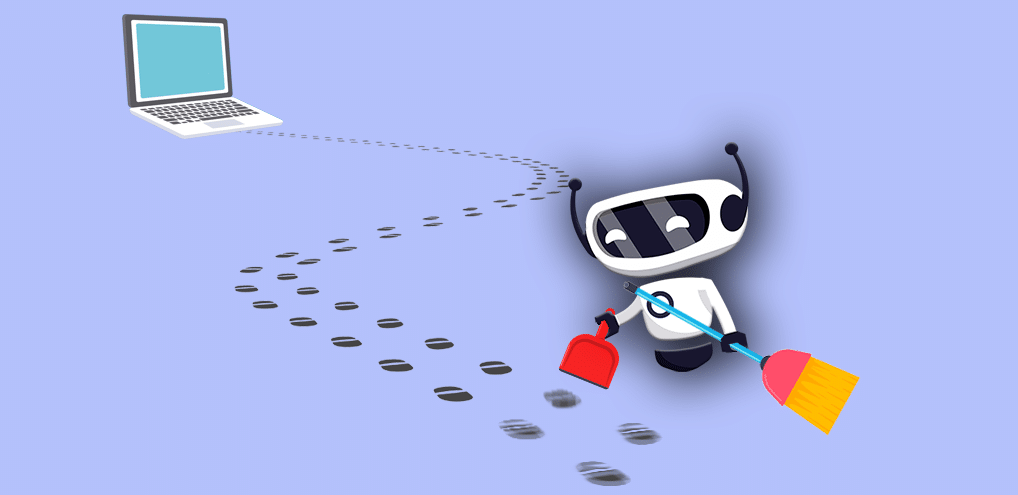What is a digital footprint?
Whatever you do online, you leave a trace behind. To some extent, you can and should control this. 
The digital footprint you leave when browsing the Internet is usually categorized into an active and a passive one.
The active footprint is essentially everything you post online yourself. For example, your posts on social media like Facebook or Instagram would be considered active footprints. Your passive footprint is information like your IP address and cookies stored on your computer. The passive footprint is mostly used for advertising purposes, such as for targeted advertising. For example, if Facebook sees that you are interested in buying certain things, it would show advertisements of said things on its platform.
There are many benefits to reducing your digital footprint. If you care about your privacy, you likely do not want your personal information to be accessible to random people on the Internet. Thus, reducing at least your active footprint is a good idea. Think about all the information you have posted thus far on your social media profiles. Can it be used against you? For example, would a scammer be able to get enough of your personal information to successfully perform phishing or a social engineering attack? The less information about you can be found online, the lesser the chances of you being targeted in various cyber criminal activities.
Completely removing your online presence from the Internet can be very tricky, and frankly, probably impossible. However, you can greatly reduce it. And it’s pretty easy. Do not wait until someone has already taken advantage to protect yourself.
Below you can find a few steps you can take to reduce your digital footprint.
7 ways you can reduce your online footprint
Reducing your digital footprint does not require extensive knowledge or skill. It’s all quite easy. All you need to do is follow a few simple rules and you should have no issues.
- Use generic email addresses for non-personal accounts
If possible, have separate email addresses for personal/work use, and for registering accounts for things like online games or apps. A game you will only play once or some random online service certainly does not need to have your personal email address so there is no reason to provide it. The less you give out your personal email, the better.
There are plenty of disposable email services that generate random email addresses without you even needing to sign up. Alternatively, you can create an email account and use it for all generic signups. You can also use services that hide your email. Apple offers this service when signing up for apps on iPhones. The feature would hide your actual email address from the app but you would still receive the emails from it.
- Avoid using your personal information when signing up for generic services
When signing up for anything, you are always asked to provide your name, date of birth, and other personal information. However, there is often no need to actually be truthful most of the time, particularly because many sites are certainly not protecting that information to the best of their ability. If you signing up for some game or app, or any service you won’t pay for, use fake information. Of course, if you are planning on purchasing something, you should and need to provide correct information.
- Google search yourself
Doing a Google search of yourself is a great way to see what kind of information about you is freely available to anyone. If you find that Google links to your social media profiles or some account you no longer use, you can easily fix this by deleting unused accounts and changing settings so your social media cannot be searched via search engines.
- Private social media profiles and check privacy settings
Unless your work requires you to have an online presence, there is no need to have public social media profiles. If you are an avid poster, your social media accounts likely contain quite a lot of personal information, things that can be used to perform various kinds of scams on you. And the reason you’re likely even reading this is that you want to reduce your online footprint, and that involves making your social media private.
In addition to making your social media profiles viewable to only people you know, you should also change your privacy settings. We recommend making your profiles nonsearchable via search engines. You should also turn off the feature that allows others to look up your profiles using your phone number.
- Avoid logging in with Facebook or Google
If you have a Facebook and/or a Google account, you likely noticed that you are sometimes offered to log in to certain accounts using them. While it may be convenient in some cases, it’s not recommended to use this feature for anyone who cares about their privacy. The moment you click “Log in with Facebook/Google”, your information gets transferred to the site/service you’re signing up for.
- Deactivate/delete unused accounts
All accounts you no longer use should be deleted or at least deactivated. Dating, social media, forum, etc., accounts should all be deleted if you no longer use them, especially if they are connected to your personal email account and have your personal information on them.
- Be mindful of what you post
Every time you post anything on social media or a forum, consider whether it can be used against you. Avoid posting about places you visit often, stop using the “Check-in” feature social media sites like Facebook provide, do not post your personal information, etc. Information you post could be used to perform phishing attacks or some kind of scam. For example, if you post on social media about how you have a lot of cryptocurrencies, someone may try to get into your accounts to steal them. People often post information about themselves without considering the consequences. The less you post, the better it will be for you.